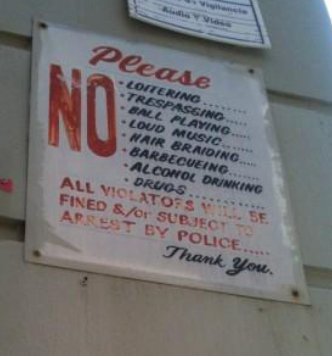Harlem
New York City: Harlem
April 27th 2012
When I first moved to London a friend who lives in Berkshire rang to ask if she and her husband could come and stay overnight.
They seemed a bit unsure about whether to bring the car and, with a bit of prompting admitted that they thought I had moved to Deadwood, not Bethnal Green. Quite convinced that I went to sleep every night with the sounds of inner- city implosion ringing in my ears. I did point out, in a slightly churlish voice, that they have Broadmoor Special Hospital in their parish. I have been there on a Monday morning when they test the "Ooh Betty, we lost one" siren. If that siren goes at any other time you want to make sure the back door is locked. They think my preoccupation with their local hospital is quite funny. Like most things it's about perception.
Harlem is right at the edge of my comfort zone. I am not scared exactly but wary. I think about the times of day I walk about, how I engage with people, who I make eye contact with and what I am wearing. A pair of boots which are entirely unremarkable in London get stared at here to the point where I have to go home and take them off. Early mornings feel peaceful, late afternoons feel tense. After dark people sit on their steps and play music and chat. Every few minutes there is a comforting blast of noise from the trains coming up from the subway.
Living in London has helped me to distinguish, to some extent, what is genuinly threatening and what is not, and yet still I wonder. I am aware that I am in the middle of a culture that I don't understand, its gestures and ways of doing things are unfamiliar. I think it is this which makes me feel a bit anxious when I am out. Not that its particularly dangerous, it’s just that I don’t know where the minefields might be.
What is true is that Harlem is still the biggest African American community in the U.S.A.
A place which has punched above its weight historically and culturally over the last century. In the twenties and thirties Harlem's jazz clubs and Speakeasies attracted people from all over the world to places like the famous Cotton Club, and it spawned the careers of legends like Fats Waller and Paul Robeson. It is said that the civil rights movement started here, and so did the rise of black activism, with many local landmarks renamed in honour of famous Harlem residents who stood up against racism and oppression. Harlem also punched above its weight in its reputation for being an enormous ghetto, particularly in the seventies and eighties when it existed right at the edge of even New York City's comfort zone. The area above Central Park was a place you were advised not to stumble into by mistake. Poverty and overcrowding were rife and Harlem seemed to miss out on whatever regeneration money was available. These days there is a bit more money, some long-awaited regeneration happening, and a big drop in the crime rate. To me it stills feels like a place on the edge, which is all but impenetrable to anyone who wasn't born here. It's hard to engage with people as an outsider, although not impossible.
In the middle of all of this for two hundred years has stood The Abyssinian Baptist Church, heavily involved in the civil rights movement and these days, in million dollar regeneration projects and social outreach. Its Gospel choir is famous and the queues on a Sunday morning mean they have had to put on extra services. I can also vouch for it having the most glamorous clergy I have ever met and the best food..
I went there with Clyde for a meeting yesterday about a minimum wage bill which is being battled out between the city council and the mayor's office. The gist, I think, is that too many New Yorkers can't afford to live on what they earn from working full-time. The Mayor, Michael Bloomberg, thinks that all those who are supporting the bill are communists (I kid you not!) who are out to ruin big business and he is using his executive power to veto the bill. At which point the council will override him. No, I don't really understand it either. What was obvious was the level of support for the bill from religious groups. The meeting was attended by representatives of every church known to humanity and a few more. There were Pentecostalists from Queens, Baptists from The Bronx and Catholics from Brooklyn as well as a Rabbi, an Imam and a rather beautiful Buddhist called T.K Nakagaki who looked over his glasses and told us all to pipe down! Religious groups, and not just the conservative mouthy ones we hear about in Britain, speak truth to power in this country and exert influence in significant places. The thought might make you shudder until you see it working at a very grassroots level, with the church giving a platform and a microphone to people who otherwise would find it very hard to be heard. Most of those who spoke yesterday were directly affected by New York City's lack of a living wage. Desiree Pilgrim Hunter who has chaired the lobbying group described her own situation in which she worked forty hours a week as a shop assistant but was still unable to support both of her daughters.
I have a mental picture of Mayor Bloomberg shaking his fist and saying "those pesky Christians, Buddhists and Jews.."
